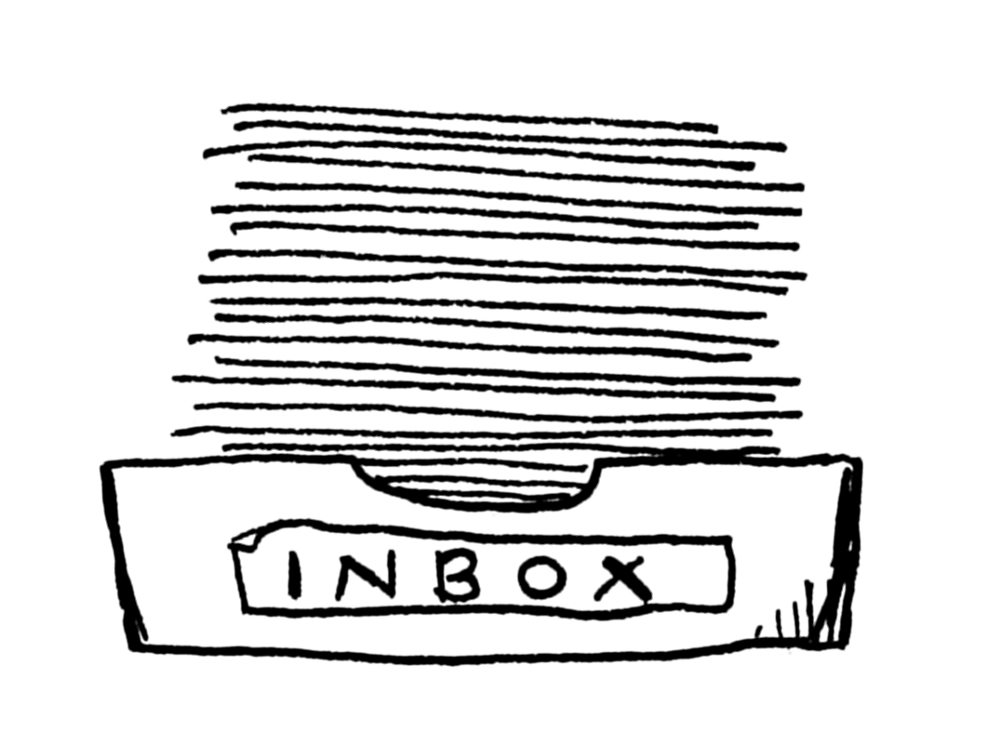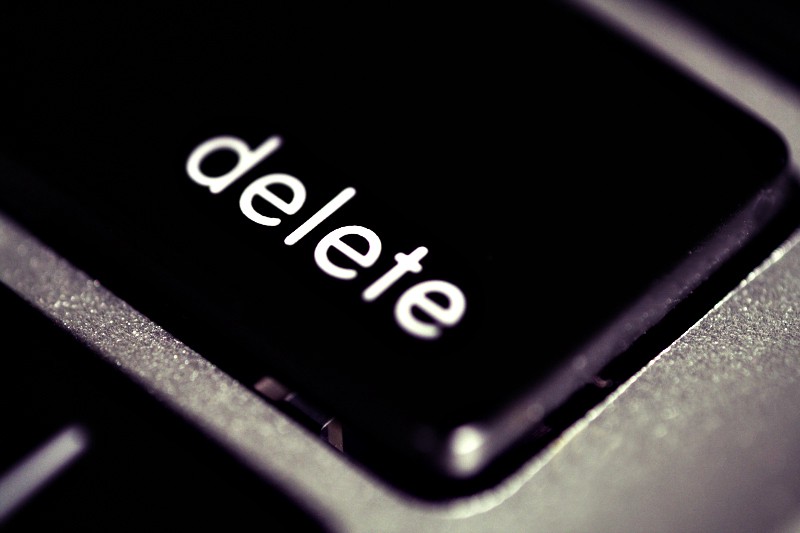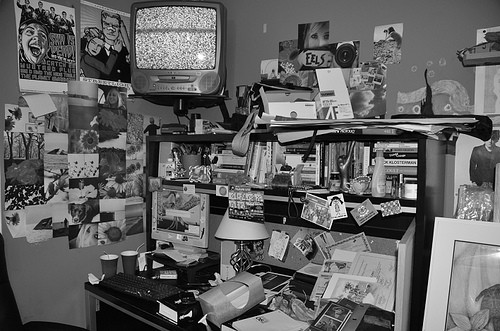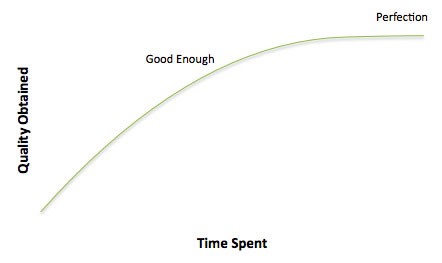10 Ways to Manage Your Time & Avoid Endless Distractions
We did it everyone! It’s 2016! We made it to the future! Congratulations all around. The year is filled with so much promise just waiting to be derailed by the mundane.
When it comes to the constant battle of the urgent versus the important, no time management strategy lasts forever. It’s a series of strategies and tactics that will enable us to look back on 2016 with more pride at what we’ve accomplished than regret at what might have been. (Did you catch that? This year is only hours old and I just skipped ahead to the end. Life moves so quickly nowadays.)
Several years ago I compiled a list of ten ways that helped me manage my time and avoid distractions. With 2016 upon us and a handful of exciting things I want to accomplish, I decided to consult my list again to see which ones might be useful to help me get my goals over the finish line.
Below is an updated version of the original post in case you too are looking for a few time management strategies. Feel free to borrow any of these items — I certainly did — or add to the list.
Am I the only person who occasionally finishes a busy day at the office only to discover that I didn’t accomplish any of the truly important things — the things that actually move the organization forward — on my To Do list? I’m exhausted. I’ve worked hard all day, sent a flurry of emails, returned some calls, participated in a bunch of meetings, and still am staring at a list full of “do or die” long-term priorities. I dare say that this isn’t unique to me (please don’t let this be unique to me).
A friend of mine described this as the classic battle of the urgent versus the important. If left unchecked, the urgent will fill our days for years to come, seducing us with a sense of accomplishment. In the end, though, the urgent work doesn’t change the world. The important work does.
Over the years, I’ve tried and refined several different approaches that helped me get more important work accomplished. Below are ten ways I’ve found to help manage my time and avoid the endless distractions in order to tip the odds in my favor. Godspeed to you in this epic quest!

Pregame your work
Before you race out of the office on Friday, take five minutes to jot down what you think should be your top three “do or die” priorities for the coming week. Paste the list on your monitor (old school, I know). During the following week, start each day by assessing the relative importance or urgency of items on your full To Do list as compared to your “do or die” priorities. Variation: Is public shaming a motivator for you? Start your week with a team stand-up. Give each person 30 seconds to relay their 2–3 “do or die” priorities for the week. Write them on a white board where the team can see them throughout the week. Each Monday review the list together and mark uncompleted items with an X. This also serves a great way to discuss what your coworkers view as priorities and offers everyone a chance ask clarifying questions. Related: Use your morning commute to think through what success looks like for each meeting during your day. To quote another friend, if you don’t know what you need to get out of a meeting, you don’t stand a chance at achieving it.

$1 for your thoughts
Do you work in an open office? Or at a coffee shop with the fascinating conversation of nearby strangers? A dollar or two can go a long way to helping you block the distractions so you can stay focused longer and accomplish more. Download the White Noise app for your iPhone and crank up a thunder storm. Or try Coffivity and take the coffee shop with. My personal favorite when working in noisy public spaces is the “crowded room” sound. Suddenly my neighbor’s conversation about their crazy night melts into the electronic din.

The meeting-free zone
At Fractured Atlas we go with “No meeting Fridays.” It’s not exactly a formal policy, but something we try to respect. Meetings are a fact of life and actually can be quite productive. However, having a day when you can dedicate large chunks of uninterrupted time can help keep you focused and in the zone while tackling important projects. Pick a set day of the week when you’re not going to schedule any meetings, then protect it. Beware: That “quick 15-minute meeting” can totally kill the benefits of an otherwise productive “no meeting” day.
 Image by iconsmind.com
Image by iconsmind.comLet it go to voicemail
Close the IM client. Wear a “I’m working on important shit don’t disturb me” hat. Just because other people are trying to reach you doesn’t mean you need to be reached. If it truly can’t wait, they’ll make it known. When people email you or leave you a voicemail, they’re adding something to your To Do list. They’re in essence saying that their priorities should be your priorities. (If they’re your supervisor, then they may be correct. Less likely if it’s a sales call from Staples.) Be protective of your time. Just because someone calls or emails doesn’t mean he needs an answer ASAP. Usually it can wait a bit.
 Image by Creative Stall
Image by Creative StallLeave breadcrumbs
If you’re in the flow, it takes 23 minutes to recover from a distraction. Distractions and interruptions are inevitable, so figure out a system to help you reduce your reentry time. When you get interrupted, ask the person to give you a second to jot a quick note to remind yourself where you left off and what were to be your next actions. It might not save you the full 23 minutes, but it can cut down considerably on the time it takes you to get back into the flow.
 Image by Mixy Lorenzo
Image by Mixy LorenzoDelete everything in your inbox
OK, this is a bold move and one that not everyone has the luxury of trying. [Full disclosure: I’ve never done this but fantasize about it on occasion.] That said, I know a CEO who returned from vacation to find his inbox packed with 700 new messages. He started to reply to them and quickly realized how much time it would take to reach Inbox=Zero. A full day’s work, or more. What kind of opportunity cost would that mean to his company? Instead, he did something unconventional… deleted all of the messages in his inbox. He figured if something was truly important, someone would get back to him. Amazingly, the world didn’t end! Only a handful of people contacted him again about those items. The company went on generating profits and being successful. As you trudge through all of those emails, and the responses, and the responses to the responses, keep in mind the opportunity costs. Maybe you can decide that a few messages can be deleted or left to ride for a few days. See if the sender gets back to you; they often don’t because whatever it was worked itself out.
Give unto others
It’s okay to delegate. Don’t be a martyr. You don’t have to do everything. Once this system starts working, you’ll kick yourself for not implementing it sooner. No, this isn’t as easy as handing a project to someone and saying, do this. Early in the relationship people need more guidance than after you’ve developed a delegating rapport with them. Start small. Don’t expect to assign as an initial project the big proposal that could make or break your company. Mistakes will be made, so lower the risk and up the guidance. Be clear and specific about the deliverables, why this is important, and how it fits into the bigger picture. Then allow some room for people to fail, or succeed in a different way than you expected. Delegating isn’t the Vulcan mind meld. It’s an active working relationship that’s likely to hit some snags along the way. That’s not a reason to play the martyr and say, if I want something done correctly I need to do it myself. That approach doesn’t scale and certainly doesn’t benefit your organization. Nobody around to help you? Explore these options. Tip: Think of yourself as the coach of a college basketball team during March Madness. Ever see the coach of a great team walk out onto the court at the start of the game, give a few instructions, and then sit silently on the bench until the final buzzer? Me neither.
 Image by 10ch
Image by 10chCheck your email twice a day
I’ve heard about this technique over the years but only recently tried it when by sheer necessity I was pulling an 8-hour leg of a road trip. Once in the morning and once in the afternoon, answer your emails. The rest of the time close down your email client and resist the incessant urge to check if anyone has been thinking about you. You probably won’t die. This system will allow you to create much more productive blocks of time in your day to focus on the important work. And I promise you’ll find that sometimes things actually resolve themselves when you’re not looking (or checking), or a colleague eloquently chimes in with exactly what you would have said but now don’t have to.

Don’t clean your desk
I often refer to this as cleaning your dorm room before starting work on that term paper. Don’t do it! Tackle the important stuff first. Resist the urge to feel like you’re making progress by checking off a number of small, easy items. They just eat up your time and drain your brain power, so you’re left to tackle the important stuff at less than maximum capacity. Give yourself 90 minutes of focused and uninterrupted time to work on something important each morning before tackling all those “quick little things” that have a habit of filling the day. Resist the urge to quickly reply to a few emails, do a few brief tasks, chat with a colleague about Game of Thrones, etc., etc. No, walk into the office, sit down at your desk, open that Word, Excel or presentation document and dive right in. Distracted by coworkers? Arrive early to the office so you’re wrapping up your initial 90 minutes when the place starts to come alive. If you’re still tempted to quickly check the tracking on that Amazon package, the weekend weather, or IM your friend to confirm evening plans, go hardcore and block your internet and email servers for a set period of time using something like Self-Control (Mac) or Freedom (PC). Related: Work like you love tomatoes. (Hat tip to my former coworker Gary Moore for this one.) It’s called the Pomodoro Technique. For those who feel like the 90 minute period cut off from the world would be deadly, The Pomodoro Technique — 25 minutes on, 5 minutes off, repeat — is a lighter weight approach. Plus you can order a kitchen timer shaped like a tomato. I tend to find that this technique works better for me in the afternoon when long stretches of uninterrupted work are tougher to manage as my mind starts to tire.

Don’t Let Perfect Be The Enemy of Good
This little gem will save you years but is often the most difficult to implement. We’ve all been there, spending countless hours on a project to get it 90% complete and then spend the same amount of time to move it the final 10%. In the grand scheme of things, did the last 10% really matter? Did anyone even notice? We have finite time in which to accomplish our important work. Don’t squander 4 hours of precious time on something that won’t affect the outcome. Don’t let perfect be the enemy of good. This is often the biggest challenge for the type-A, overachiever, perfectionists among us. I mean, don’t release work riddled with spelling errors and shoddy design — there is a certain bar you need to clear (that’s the 90%) — but don’t obsess and toil away on that last 10% if there will be no discernible impact. Tip: Deputize a trusted friend or colleague to grab you by the collar and say, “Tim! Wrap it up and move on.”
So, on that note…
About Tim Cynova
Tim wears a multitude of hats, all in service of creating anti-racist workplaces where people can thrive. He currently is co-CEO of Fractured Atlas (an entirely virtual organization with staff spread across multiple states and countries) and a Principal of the consulting group Work. Shouldn't. Suck. He serves on the faculty of Banff Centre for Arts & Creativity and The New School teaching courses in People-Centric Organizational Design; he's a trained mediator, and a certified Senior Professional in Human Resources (SPHR). Earlier in his career, Tim was the Executive Director of The Parsons Dance Company and of High 5 Tickets to the Arts in New York City, had a memorable stint with the Cincinnati Symphony Orchestra, was a one-time classical trombonist, musicologist, and for five years in his youth he delivered newspapers for the Evansville, Indiana Courier-Press. Also, during a particularly slow summer, he bicycled 3,902 miles across the United States.


